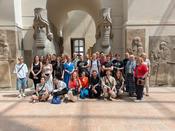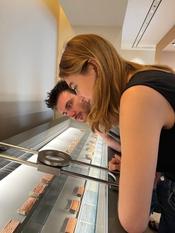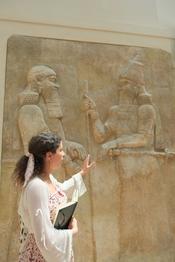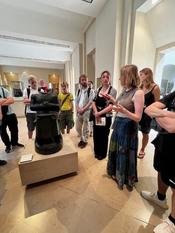Excursion to the Louvre
In June 2025, an interdisciplinary group of students explored important collections of Near Eastern archaeology in Paris during a five-day field trip. Visits to the Louvre, the Collège de France and the University of Nanterre offered exciting insights into research, museum practice and the history of science.
Excursion to the Louvre – Insights into the World of Ancient Western Asia
In June 2025, an interdisciplinary group of students from Freie Universität Berlin embarked on a five-day excursion to Paris, focusing on the renowned collections of the Louvre dedicated to the archaeology and history of the Ancient Near East. Accompanied by Dr. Cinzia Pappi and Marina Weiss, the students represented diverse disciplines, including Near Eastern Archaeology, Ancient Oriental Studies, Prehistoric and Protohistoric Archaeology, Classical Archaeology, Iranian Studies, and Geography, forming an interdisciplinary team that greatly benefited from the thematic richness of the program.
Day 1 – Visit to Nanterre
The trip began with a visit to the archive of archaeologist André Parrot in Nanterre, where Pascal Butterlin provided exclusive insights into Parrot’s extensive materials. Parrot is internationally renowned for his excavations at Mari in Syria, among other significant contributions.
Day 2 – First Visit to the Louvre
At the Musée du Louvre, curators Sophie Cluzan and Grégoire Nicolet welcomed the group and guided them through the Department of Near Eastern Antiquities. The tour focused on significant objects from Mesopotamia, Iran, and surrounding regions, complemented by discussions on provenance issues, the collection’s history, and current research perspectives.
Day 3 – Jules Oppert Exhibition and Return to the Louvre
On the third day, the group visited a special exhibition on Jules Oppert at the Collège de France, guided by Dominique Charpin and Nele Ziegler, who offered fascinating insights into the origins of Assyriology. In the afternoon, the students returned to the Louvre, focusing on the second millennium BCE and the cultures of Mesopotamia and Elam.
Day 4 – Louvre: First Millennium BCE
The fourth day was dedicated to the first millennium BCE, with a focus on the Neo-Assyrian Empire, the Achaemenid Empire, and the cultures of the Levantine region. Intensive engagement with the objects offered deeper insights into the political and cultural developments of these periods.
Day 5 – Return Journey and Individual Explorations
On the final day, participants had free time to explore Paris independently before beginning their journey home.
Conclusion
The excursion provided direct access to outstanding museum and archival resources while fostering interdisciplinary exchange among the participating fields – an enriching experience that significantly contributed to the academic training of the next generation of scholars in ancient studies.
(Text: Cinzia Pappi)



